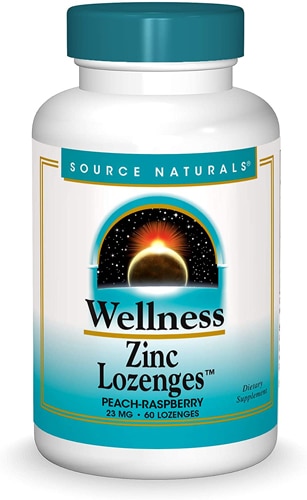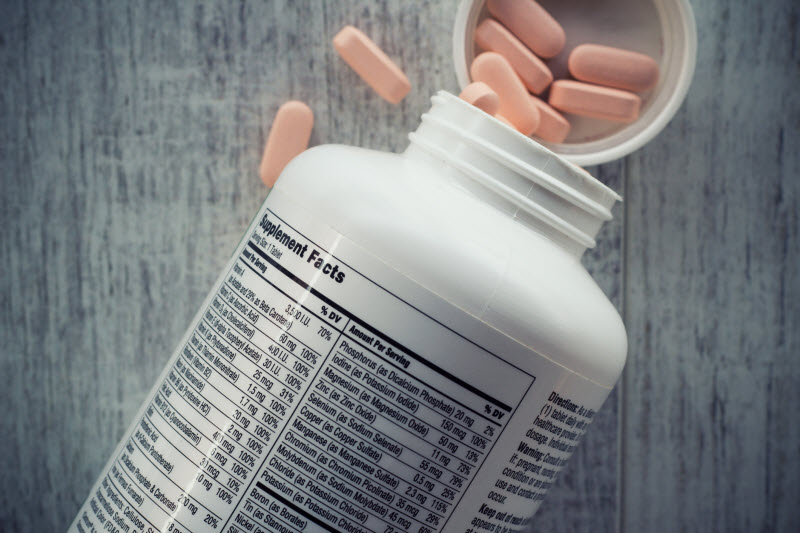You may be one of them: The 4 in 5 American adults who supplement with vitamins and minerals on the daily. If so, chances are you consistently reach for a multivitamin. It’s no wonder: Plenty of multivitamins pack a potent punch, supplying you with the essential micronutrients you need to function at your peak. While supplements should never replace food—they’re called “supplements” for a reason—they can boost an already-wholesome diet or fill in nutritional holes resulting from pregnancy, chronic conditions and more. In other words, multivitamins are a form of health insurance—and many know it.
And yet, ask the average U.S. resident what, exactly, their multivitamin contains, and you may receive a pleasant but confused shrug. Which is a shame, really, as not all multivitamins are created equal. In addition to heavy hitters such as vitamin C, magnesium, folate, and vitamin D, your multivitamin ought to include vitamins and minerals that’ll naturally encourage well-being.
Here are five multivitamin ingredients you should seek out in your multi, 3 “extras” you might benefit from, and how to get more of these nutrients in your diet:
1. Calcium
While Americans may be known for their consumption of dairy products, The Journal of Nutrition reports that only 32% of U.S. residents meet the adequate intake of calcium through diet. As a key player in a number of bodily functions—including bone health, muscle contractions, hormone secretion, blood clotting and more—meeting the daily recommended requirement is crucial to whole-body health. Look for a multivitamin that contains this gem.†
Eat Smart: Yogurt, milk and cheese may be the first foods you think of when calcium enters the conversation, but seafood and plants brim with calcium too. Reach for curly kale, almonds, salmon and sweet potatoes to get your bone-mineral hit.
2. Zinc
Zinc lozenges have become trendy in recent years, and yet you shouldn’t only remember to take this essential trace element when you’re sick. Acting as an antioxidant within the body, zinc organically supports protection from free radical damage, immune health and metabolism. According to the Mayo Clinic, women should get 8 mg per day; men, 11 mg. A multivitamin should contain 50% of your RDA.†
Eat Smart: Happen to be a fan of seafood? You’re in luck: Oysters, Alaskan king crab, and lobster are excellent sources of zinc. Lentils, yogurt, oatmeal and mushrooms supply great amounts of the nutrient too.
3. Iron
Iron has long been associated with healthy red blood cells and increased energy levels, but new research shows that the nutrient may support brain power too: Researchers at Pennsylvania State University and the University of Nebraska at Lincoln found that students with normal iron levels had higher GPAs (this was especially true when adequate iron was paired with fitness). What’s more, iron naturally supports your immune system. The recommended daily amount for adults is 18 mg.†
Eat Smart: While foods derived from animals such as beef, chicken, eggs, and fish contain a type of iron that’s more easily absorbed (heme iron), a number of plant-based foods are rich in non-heme iron and can supply you with the amounts you need. These include spinach, pumpkin seeds, quinoa, dried apricots and—if you ever needed an excuse—dark chocolate.
4. Selenium
It may be often overlooked—or not known at all—but selenium is central to health as well; as Prevention puts it, “Considering how vital selenium is to your health and weight, it’s lucky that you don’t need much of this mineral.” While you need only a trace of this, well, trace mineral, you do need it for a variety of activities, including proper thyroid function, tissue repair, immunity, blood flow and, yes, metabolism. Those ages 14 and up should aim for 55 micrograms per day, while pregnant women should shoot for 60 micrograms.†
Eat Smart: One of your best bets for selenium? Brazil nuts. These earthy wonders boast 554 mcg of selenium in as little as 4-6 nuts. Other top options include yellowfin tuna, turkey, chicken, and cottage cheese.
5. Vitamin B12
The B vitamin complex is indispensable to total body health. A water-soluble vitamin—meaning, it’s not stored in your body and must be derived from food and/or supplements—it plays a strategic role in a series of physical functions, from naturally supporting the health of your central nervous system to organically fostering a better night’s sleep. Additionally, vitamin B12 facilitates energy production and the construction of DNA. The recommended amount is less than 3 micrograms per day.†
Eat Smart: Nonfat plain Greek yogurt, fortified cereal and canned tuna are all terrific options for getting more B12 into your diet.
Multivitamin Extras: 3 Blends to Try
1. Whole food blends
…and we’re not talking about the designer health food chain, either. “Whole Food” multis are exactly what they sound like: Multivitamins that contain whole food concentrates (as well as additional vitamins and minerals). Blends of these sort are ideal, in that they’re made up of fewer synthetic ingredients and more natural elements. One to try: Dr. Mercola's Whole-Food Multivitamin.
2. Probiotic multivitamins
Probiotics organically bolster gut health. Pair them with a spectrum of essential nutrients—such as vitamin E and niacin—and you have yourself a dual-purpose, winning product. Look for probiotic multivitamins that contain 1 billion CFUs of key probiotic strains, such as L. acidophilus and B. infantis.†
3. Enzyme blends
Enzymes assist the body digest and absorb nutrients. Adding enzymes to multivitamins improves the utilization of the vitamins and minerals contained in the product—and enhances your overall health.†
†These statements have not been approved by the Food and Drug Administration. These products are not intended to diagnose, treat, cure or prevent disease.




